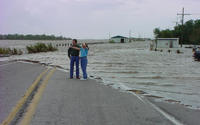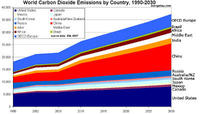-
Former world leaders say global water crisis must be addressed
In March 2008, the U.K. intelligence services, in a report to then-prime minister Gordon Brown, warned that the deteriorating fresh water situation around the world would soon lead not only to tensions over water between states, but to “water wars”; world leaders, at least former world leaders, agree that the global water situation is dire, and twenty of them, led by Bill Clinton, meet to discuss solutions
-
-
Human impact of rising oceans will extend well beyond coasts

Identifying the human impact of rising sea levels is far more complex than just looking at coastal cities on a map; rather, estimates that are based on current, static population data can greatly misrepresent the true extent — and the pronounced variability — of the human toll of climate change; a new study focuses on four regions identified as highly susceptible to flooding: the tip of the Florida peninsula, coastal South Carolina, the northern New Jersey coastline, and the greater Sacramento region of northern California; the study finds that by 2030, more than nineteen million people will be affected by rising sea levels just in their four study areas
-
-
DHS completes tests on mind reading technology

DHS officials recently completed an initial round of tests for its new intent detecting technology; with the Future Attribute Screening Technology (FAST) program, DHS hopes to be able to identify terrorists or criminals before they execute an attack; FAST relies on remote sensors to measure several physical indicators like heart rate and how frequently one’s eyes flit back and forth; so far the technology has only been tested in a laboratory setting, but DHS says that it has been able to achieve a 70 percent accuracy rate; in the next battery of tests, officials will examine how FAST fares in more realistic settings; many scientists criticize the program for the dubious science behind it
-
-
Germany to scrap nuclear power by 2022

Germany yesterday announced plans to become the first major industrialized power to shut down all its nuclear plants in the wake of the disaster in Japan; phase-out due to be wrapped up by 2022; it means that the country will have to find the 22 percent of its electricity needs currently covered by nuclear reactors from another source; Monday decision is a U-turn for Chancellor Angela Merkel, and means that the current government has adopted the timetable for a nuclear phase-out set by the previous Social Democrat-Green coalition government a decade ago; it also cancels Merkel’s decision from November 2010 to extend the lifetime of Germany’s seventeen reactors by an average of twelve years, which would have kept them open until the mid-2030s
-
-
Future UAVs will emulate birds
Engineers at UC San Diego are mimicking the movement of bird wings to help improve the maneuverability of unmanned aerial vehicles (UAVs); this is important, because UAVs are quickly becoming popular tools for the armed forces, and there are also a myriad of civilian applications which are rapidly developing, such as border control, wildfire monitoring, search and rescue, and traffic observation
-
-
DARPA crowd-source next-gen UAV design
DARPA has announced its UAVForge competition for the design of a user-intuitive, backpack-portable UAV which is also quiet, can stay aloft for at least three hours, and can fly in harsh condition; in addition to the $100,000 prize, the winning team will have the opportunity to showcase its design in an overseas military exercise
-
-
Global carbon emissions at record high

Global carbon emissions are at their highest ever levels, increasing fears of a global temperature rise over the “dangerous” two degrees Celsius threshold; unpublished estimates from the International Energy Agency revealed that the world economy’s return to growth in 2010 coincided with a 1.6 gigaton rise in carbon dioxide emissions, the highest ever recorded jump
-
-
Global warming: Arctic access by land will diminish, but improve by sea

Global warming over the next forty years will cut through Arctic transportation networks like a double-edged sword, limiting access in certain areas and vastly increasing it in others in absolute terms; winners are expected to be coastal communities, coastal resource-extraction operations, tourism, fishing, and shipping concerns; potential losers include inland mining and timber operations, inland oil and gas drilling, and smaller inland communities, often inhabited by indigenous peoples; Canada and Russia stand to lose the most winter-road potential as rising temperatures will prevent up to 400,000 square miles from hardening into potential roadways
-
-
Making high-speed rail tracks safer

High-speed rail requires prestressed concrete railroad ties, as wooden cross ties are too flexible; for these ties to be effective, prestressing forces must be applied at a considerable distance before the rail load is applied; this is called the transfer length; to resist the heavy impacts the concrete ties utilize about twenty steel wires, each stressed to around 7,000 pounds; if the prestressed force is not properly transferred, failures can occur in the track
-
-
Smartphone apps help thousands in latest storms
In the recent string of natural disasters to hit the Midwest, emergency communication smartphone apps have proven invaluable for contacting family members and first responders; during these natural disasters, telephone lines and cell phone towers are often inundated with traffic, leaving individuals unable to contact their loved ones or even reach 911; thanks to smartphone apps like Life360, individuals have been able to contact family members to let them know they are okay, or alert emergency workers if they are in trouble; during the floods that left Memphis, Tennessee under water, more than 2,400 families used the app to share their locations and confirm their safety
-
-
More tornadoes headed to Joplin, Missouri
As emergency responders pick through the wreckage from Sunday’s massive tornado in Joplin, Missouri, residents are preparing for another monstrous storm that could generate more deadly tornadoes; meteorologists anticipate that thunderstorms will hit Joplin once again on Tuesday night; rescue workers raced to sift through the rubble in search of survivors before the next storm hits; it is estimated that 30 percent of the city has been destroyed after the tornado carved a three-quarter mile wide path of destruction; so far officials have confirmed that at least 117 people are dead, more than 600 injured, and approximately 1,500 are still missing from one of the country’s deadliest tornadoes in over sixty years; initial projections rate the monstrous tornado as an EF-4 with wind speeds of 166 to 200 miles per hour; it is reported that the mile-wide funnel contained two cyclones inside; President Obama is currently overseas in the United Kingdom, but plans to visit Missouri this weekend after returning from Europe
-
-
China admits to critical flaws at world’s largest dam
Last week, the Chinese government made a rare announcement and publicly admitted that there were critical problems at the Three Gorges dam, the world’s largest hydroelectric dam, lending support to the growing opposition to future dam projects; with the approval of Chinese Premier Wen Jiabao, the country’s second in command, last Thursday the State Council announced that the Three Gorges dam had been plagued by a series of problems “urgently in need of resolution”; problems include ecological deterioration, geological disasters, and the lingering uncertain status of more than one million people displaced by the dam; this is the first time such a high-ranking government official has publicly acknowledged the dam’s problems
-
-
Online university announces Master’s in homeland security program
An online university recently announced that students can now enroll in its online degree program to obtain a Master’s of Science in Homeland Security; the online degree can be earned through Capella University, an accredited online university with nearly 40,000 students currently enrolled; courses will focus on topics like emergency preparedness, management, infrastructure protection, threat analysis, media communications, and cyber security
-
-
Western states could face disastrous floods from record snowpacks
Western states could soon face disastrous floods like the Midwest due to record snowpacks; heavy winter storms and an abnormally cold and wet spring have resulted in record snow levels for May in states across the west including Montano, New Mexico, Colorado, and California; officials worry that if June is particularly hot and sunny, the snow could melt too quickly and inundate the region’s rivers with torrents of water; officials are particularly concerned about flash floods as they can occur with little warning; officials are bracing for the worst holding emergency drills and releasing thousands of gallons of water to make room in reservoirs
Western states could soon face disastrous floods like the Midwest due to record snowpacks -
-
Tornado kills at least 116 in Joplin, Missouri
Residents and emergency responders are searching for survivors in Joplin, Missouri after a tornado tore through the town Sunday evening; the tornado tore a 6-mile-long, half-mile wide path through the middle of town; much of the city’s south side was leveled, with churches, schools, businesses, and homes reduced to ruins by winds of up to 165 mph; so far 116 people have been found dead, and officials expect the death toll to rise; officials have estimated 2,000 buildings were damaged; among the ruined buildings is St. John’s Regional Medical center, the city’s major hospital; the hospital was struck directly by the tornado and lost portions of its roof, façade, and windows; the Joplin twister was one of 68 reported tornadoes across seven Midwest states over the weekend
-
More headlines
The long view
Encryption Breakthrough Lays Groundwork for Privacy-Preserving AI Models
In an era where data privacy concerns loom large, a new approach in artificial intelligence (AI) could reshape how sensitive information is processed. New AI framework enables secure neural network computation without sacrificing accuracy.
AI-Controlled Fighter Jets May Be Closer Than We Think — and Would Change the Face of Warfare
Could we be on the verge of an era where fighter jets take flight without pilots – and are controlled by artificial intelligence (AI)? US R Adm Michael Donnelly recently said that an upcoming combat jet could be the navy’s last one with a pilot in the cockpit.
The Potential Impact of Seabed Mining on Critical Mineral Supply Chains and Global Geopolitics
The potential emergence of a seabed mining industry has important ramifications for the diversification of critical mineral supply chains, revenues for developing nations with substantial terrestrial mining sectors, and global geopolitics.
AI and the Future of the U.S. Electric Grid
Despite its age, the U.S. electric grid remains one of the great workhorses of modern life. Whether it can maintain that performance over the next few years may determine how well the U.S. competes in an AI-driven world.
Using Liquid Air for Grid-Scale Energy Storage
New research finds liquid air energy storage could be the lowest-cost option for ensuring a continuous power supply on a future grid dominated by carbon-free but intermittent sources of electricity.
Enhanced Geothermal Systems: A Promising Source of Round-the-Clock Energy
With its capacity to provide 24/7 power, many are warming up to the prospect of geothermal energy. Scientists are currently working to advance human-made reservoirs in Earth’s deep subsurface to stimulate the activity that exists within natural geothermal systems.
